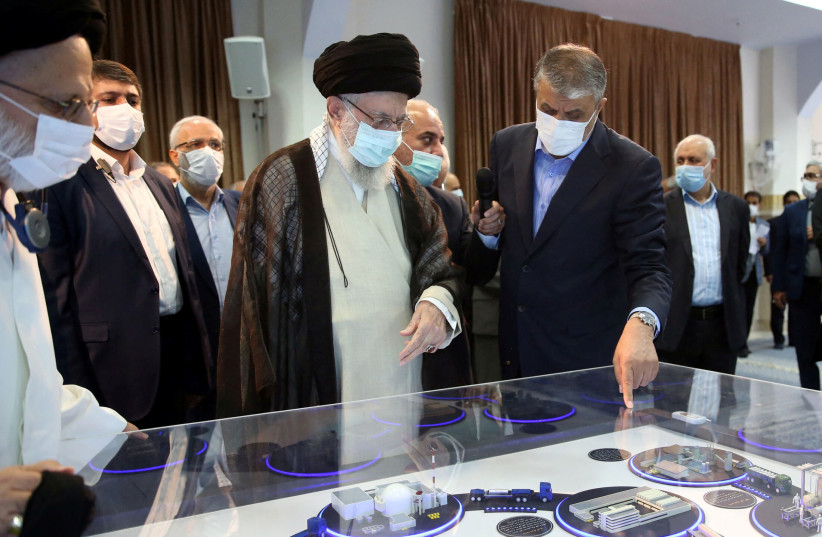Recent revelations in the US that Iranian Foreign Ministry “officials initiated a quiet effort to bolster Tehran’s image and positions on global security issues, particularly its nuclear program, by building ties with a network of influential overseas academics and researchers,” have caused controversy about how the Iran deal was sold to the public and policymakers, in an article at news site Semafor by Jay Solomon called “Inside Iran’s influence operation.”
The report builds on past revelations about great efforts that went into pushing the Iran deal back in 2014-2015. It was already known that Americans had been subjected to a huge campaign comprising of op-eds and articles designed to sway public support for a deal with Tehran, even as Iran held marches calling for “death” to America.
Tehran has become expert at getting more “bang for the buck” when it comes to its policies abroad, sending to focus on cultivating people who might be supportive – without always needing to handle those individuals directly. In essence, it gets others to run the play, and tries to invest in high-quality returns abroad, without the need for ham-handed policies, like directly funding an organization.
In the lead-up to the Iran deal, Tehran benefited from the US experiencing fatigue from an “endless war” in Iraq, as well as from Russian interests: Moscow wanted the US to stop investing in air defenses in Europe, and Iran got it to shift focus to a deal on its nuclear program.
The soft sell was that the US could reduce its forces in the Middle East if Iran was empowered, with the argument being that an empowered Iran would moderate, much as an empowered Putin would moderate once he got gas deals and the US stopped meddling in eastern Europe. The US had sunk “blood and treasure” into nation building in the Middle East, one narrative claimed, and had partnered too much with “Sunni” regimes; a correction was needed and Iran could guarantee America’s investment. To get to “yes,” Iran needed a deal on its nuclear program.

Racism and orientalism: How Iran uses Western biases to win support
Supporters of the deal said they were merely pro-diplomacy. However, from Iran’s perspective, a lot of this work aided the regime’s narrative and its demands. For instance, stories about an Iranian “fatwa” against nuclear weapons were trotted out to play on people’s beliefs in the West that Muslims are guided by religious edicts.
The way Iran has used racism and orientalism in the West to gain influence in this overall process is notable, as in this “fatwa” example. A 2013 Al-Jazeera article in English claimed that “Iranian leaders have pledged to never make nuclear weapons, which they consider a violation of Islam.” The fact that any media repeated this clearly-bogus claim was evidence in itself that the readers were being manipulated. In fact, the stories of the “fatwa” against nuclear weapons have now disappeared from any discussion about Iran’s current enrichment of uranium, perhaps because these kinds of stories don’t entice the Western, English-reading audiences like they used to.
Today, the controversy in the US is whether Iran’s foreign ministry was actually guiding the narrative and “lobby” regarding Iran, or whether these were merely individual voices who believed in diplomacy and happened to correspond with Iran’s regime. In fact, the discussion has taken on more pointed questions about whether Iranians in the West are being “smeared” for pushing for diplomacy or having contact with the regime.
For the regime, it isn’t always necessary to plow money to influence operations in the West. Sometimes, it can simply get local organizations to fund projects, and it benefits because it may be in the shared interest of some voices in the West to push for “diplomacy,” and for Iran to receive that support.
Iran invests in people, not projects
Tehran’s methodology of playing on Western needs in the era of the Iran deal to let the US extricate itself from the Middle East is a methodology Iran has used across the region. Iran’s regime invests in people, not projects. It doesn’t build dams and universities or housing, rather it finds individuals such as Hassan Nasrallah, Abu Mahdi al-Muhandis, and others to facilitate its work in places like Lebanon or Iraq; its investment is in the long term.
Once it gets locals, it then expects them to do the hard work of building up Iran’s influence. Iran doesn’t necessarily have to pay off these locals; in fact, one selling point of the regime is the apparent modesty that their friends have. For example, Qasem Soleimani always dressing in modest clothes.
Tehran has different methods for different places, but the overall strategy remains the same: “more bang for the buck.” The regime doesn’t have much money and Iran’s economy often slouches from crisis to shambles.
But Iran has what to sell, providing Russia with cheap drones to terrorize Ukrainian civilians, and stirring trouble in Syria among tribes opposed to the US-backed Syrian Democratic Forces. In the West, Iran used to get influence by selling stories about how an Iran deal would prevent “war.” Today, Tehran has largely failed in its influence campaign, but the stories about 2014-2015 show how Iran got more bang for its buck than many regimes that try to influence the West.
